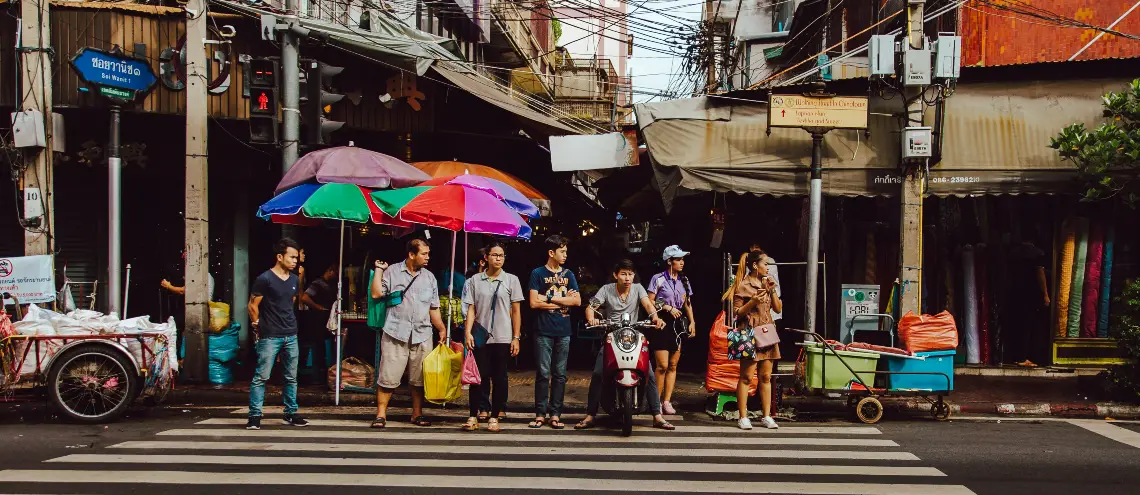The Rising Threat of Mpox in Thailand: What You Need to Know
As global travel resumes and health concerns shift from COVID-19 to other emerging diseases, Thailand finds itself facing a new challenge: the spread of monkeypox (Mpox). The recent detection of the more dangerous Clade 1b strain in the country has raised alarms among health experts and travelers alike.
This Pacific Prime Thailand article provides a comprehensive overview of what Mpox is, how it affects individuals, the implications of its spread in Thailand, and preventive measures expatriates and travelers can take to protect themselves.
Ban_sin
What is Monkeypox (Mpox)?
Monkeypox, or Mpox, is a zoonotic virus caused by the monkeypox virus, closely related to the virus that causes smallpox. It was first identified in humans in 1970 in the Democratic Republic of the Congo.
The virus is transmitted to humans through close contact with an infected animal, human, or contaminated materials. Mpox typically manifests with symptoms such as fever, an intense headache, muscle aches, swollen lymph nodes, and a distinctive rash that spreads across the body.
In recent years, the virus has spread beyond its traditional endemic regions in Central and West Africa, appearing in countries around the world, including Thailand. The emergence of new strains, particularly the Clade 1b strain, has added urgency to global health monitoring efforts.
How Does Mpox Affect People?
The symptoms of Mpox can range from mild to severe, with the illness typically lasting two to four weeks. While most people recover fully, the Clade 1b strain, now present in Thailand, is known to have a higher mortality rate, making it particularly concerning.
Individuals with compromised immune systems, children, and pregnant women are at higher risk of severe illness. Complications can include secondary infections, bronchopneumonia, sepsis, encephalitis, and loss of vision due to corneal infection.
Here are the symptoms of monkeypox (Mpox):
- Fever
- Intense headache
- Muscle aches
- Swollen lymph nodes
- Back pain
- Chills
- Exhaustion
- Distinctive rash, often beginning on the face and spreading to other parts of the body, including the palms of the hands and soles of the feet
- Lesions that progress through stages: macules, papules, vesicles, pustules, and scabs
Note: Please note that these symptoms typically appear within 5–21 days after exposure and can last for 2-4 weeks.

The Implications of Mpox’s Spread in Thailand
The detection of the Clade 1b strain in Thailand, particularly in a traveler from Europe, has significant implications for the country’s public health and tourism sectors. This strain, which is considerably more lethal than other strains, marks Thailand as the first Asian nation to report such a case, highlighting the global reach of the virus. The spread of Mpox in Thailand could disrupt the country’s recovering tourism industry, which is heavily reliant on international visitors. Moreover, the potential for wider community transmission raises concerns about the capacity of local health systems to manage a possible outbreak.
In response, the Thai government has intensified screening measures at international airports and increased public health surveillance. However, the situation remains fluid, with ongoing assessments required to contain the virus and prevent further spread.
Preventive Measures for Expatriates and Travelers
As the global situation regarding monkeypox (Mpox) continues to evolve, especially with the recent emergence of the more dangerous Clade 1b strain in Thailand, it is crucial for expatriates and travelers to take proactive measures to protect themselves.
The nature of international travel and the dynamic environment of expatriate life can increase exposure risks, making it vital to be well-informed and prepared. This section outlines essential preventive strategies, including vaccination, health screening, hygiene practices, and staying informed, to help minimize the risk of contracting Mpox while ensuring a safe and healthy stay in Thailand.
For expatriates and travelers in Thailand, taking proactive measures is essential to minimize the risk of contracting Mpox. Here are some key steps:
- Vaccination: If available and eligible, getting vaccinated against Mpox is the first line of defense, particularly for those in high-risk categories or those who have been in contact with confirmed cases.
- Health Screening: Comply with all health screening protocols upon entry into Thailand, especially if traveling from regions with known outbreaks of Mpox. Report any symptoms immediately to health authorities.
- Hygiene Practices: Maintain rigorous hygiene standards, including frequent hand washing and the use of alcohol-based hand sanitizers, particularly after touching surfaces in public spaces.
- Avoid Close Contact: Limit close physical contact with individuals displaying symptoms of Mpox, such as unexplained rashes, and avoid handling animals that might be carriers of the virus.
- Stay Informed: Regularly check updates from reliable sources such as the World Health Organization (WHO) and local health authorities for the latest information on Mpox outbreaks and recommended preventive measures.
Why Health and Travel Insurance Matter
As the global landscape continues to evolve, so do the risks associated with international travel, particularly in regions experiencing outbreaks of infectious diseases. Thailand’s recent experience with the emergence of the Clade 1b strain of monkeypox (Mpox) has underscored the critical need for expatriates and travelers to prioritize their health and safety. One essential measure in this regard is securing comprehensive health and travel insurance.
Health and travel insurance play a crucial role in safeguarding expatriates and travelers against unexpected medical expenses, especially in countries like Thailand, where new health threats like monkeypox are emerging. In the event of illness, insurance provides access to quality healthcare, ensuring that individuals receive timely and effective treatment. Without coverage, medical costs can be exorbitant, particularly in the case of serious conditions like Mpox, which may require hospitalization or specialized care.
Many health and travel insurance policies offer coverage for infectious diseases, including those contracted abroad. This coverage typically includes hospitalization, treatment, and sometimes even evacuation services if the medical facilities in the host country are not equipped to handle the illness. Given the potential severity of Mpox, having insurance that covers infectious diseases is a critical component of travel planning.
CTA_gen
Conclusion
The emergence of the Clade 1b Mpox strain in Thailand is a reminder of the ongoing challenges posed by infectious diseases in a globalized world. As the situation evolves, it is crucial for expatriates, travelers, and local residents to remain vigilant and proactive in their health practices.
By understanding the risks and taking appropriate precautions, individuals can help protect themselves and contribute to the broader public health efforts aimed at containing this virus. The Thai government and global health organizations continue to monitor the situation closely, emphasizing the importance of coordinated efforts to prevent the spread of Mpox and mitigate its impact on public health and the economy.
Pacific Prime Thailand specializes in providing expatriates and travelers with tailored health and travel insurance plans. These plans are designed to address the unique risks associated with living or traveling in Thailand, including the possibility of contracting diseases like monkeypox. With access to a broad network of healthcare providers and comprehensive coverage options, Pacific Prime ensures that individuals are well-protected against both common and emerging health threats.
Contact us to receive a free quote.
Frequently Asked Questions
What is Monkeypox (Mpox), and how is it transmitted?
Monkeypox (Mpox) is a zoonotic virus related to the smallpox virus, first identified in humans in 1970. It spreads through close contact with an infected animal, human, or contaminated materials. Symptoms include fever, headache, muscle aches, swollen lymph nodes, and a distinctive rash. Recently, the Clade 1b strain, which is more dangerous, has been detected in Thailand, raising health concerns.
How severe is the Mpox outbreak in Thailand, and what are the implications for travelers?
The detection of the Clade 1b strain in Thailand, known for its higher mortality rate, has significant implications for public health and tourism. Thailand is the first Asian country to report this strain, which could disrupt the tourism industry and strain the healthcare system. Travelers should be cautious and follow preventive measures, including vaccination and health screenings.
What preventive measures should expatriates and travelers in Thailand take against Mpox?
To protect against Mpox, expatriates and travelers should consider vaccination, adhere to health screening protocols, maintain rigorous hygiene practices, avoid close contact with individuals showing symptoms, and stay informed through reliable sources like the WHO. Comprehensive health and travel insurance is also essential to cover any potential medical costs related to Mpox.
CTA_gen
- Chikungunya in Thailand - March 27, 2025
- HIV Insurance in Thailand - March 17, 2025
- The Top 10 Best Dental Clinics in Pattaya - January 13, 2025



Comments
Comments for this post are closed.
We'll notify you
when our team replies!